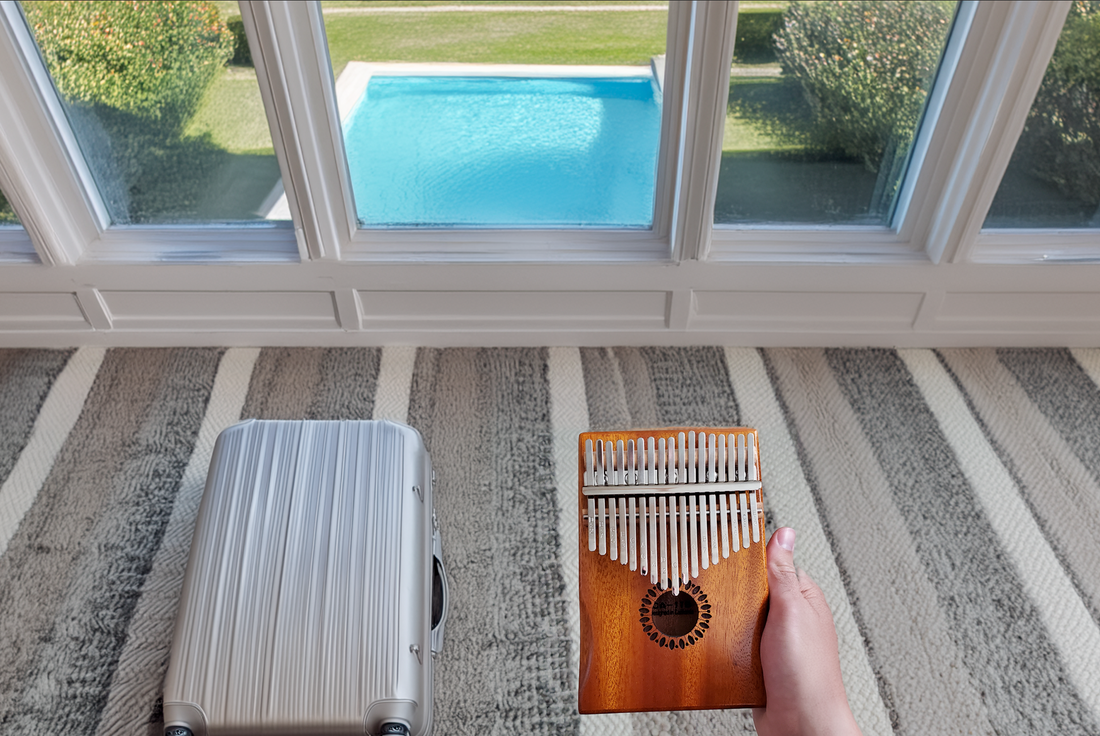
Finding Solace in the Strum
Share
" Looking back on this journey, I am grateful for the serendipitous gift that led me to the Kalimba. It has been more than just an instrument; it has been a companion, a therapist, and a teacher. Through its music, I have learned to navigate the complexities of my profession with grace and resilience. "
I am a lawyer.
As I sit at my desk in yet another hotel room, somewhere in a city whose name I scarcely remember, I find myself reflecting on the unexpected solace I discovered this past year. To many, that might sound like a title of prestige and success, and in many ways, it is. But beneath the surface of tailored suits, polished shoes, and courtrooms lies a relentless pressure that can easily take its toll on one’s soul.
Each day is a battle against the clock, a race to meet deadlines, and an exercise in managing expectations — both of clients and myself. This life, full of legal jargon and constant mental gymnastics, often leaves little room for error. And then there’s the travel. Oh, the incessant travel. Some people dream of jet-setting across the country, experiencing new places, and savoring the best restaurants. For me, it has become a routine chore. The excitement of flying has long faded, replaced by the monotony of airport security lines and the impersonal nature of hotel living.
The Gift That Changed Everything
It was on Christmas Day, 2023, when my life took an unexpected turn. Amongst the pile of neatly wrapped gifts from family and friends, there was one that stood out: a small package from a dear friend, simply labeled “For Your Soul.” Inside, I discovered a Kalimba --- A modern style thumb piano instead of a traditional African musical instrument. To the untrained eye, it might seem like an odd gift for a man of my profession. Yet, as soon as I held it in my hands, I felt a peculiar connection.
I had never played a Kalimba before. In fact, my musical experience was limited to some rudimentary piano lessons as a child, which I abandoned as soon as the demands of school and, later, my career, took precedence. But the Kalimba was different. It beckoned me to explore it, to find a rhythm in its simple elegance. The moment my thumbs brushed against its tines, I felt an almost magical release of tension. The sweet, melodic notes filled the room, and for the first time in what felt like forever, I experienced a sense of peace.
A New Routine
Integrating the Kalimba into my daily routine became an effortless decision. Each morning, before diving into the chaos of legal briefs and case files, I would spend just fifteen minutes with my new musical companion. Those fifteen minutes were mine — a sacred space carved out from the cacophony of demands that otherwise dictated my day. It was during these sessions that I discovered something remarkable: playing the Kalimba wasn’t just a hobby; it was therapy.
Every note played was a release, every chord strummed was a step towards mental clarity. The act of playing forced me to slow down, to breathe, and to focus on something other than my responsibilities. The Kalimba, with its warm, resonant tones, became my sanctuary.
As I became more proficient, I noticed changes within myself. I was calmer, more focused, and my ability to handle stress improved markedly. It was as if the Kalimba was not only a tool for music but a key to unlocking my inner peace. The music became a language through which I could express what words often failed to convey.
I began to wonder why this instrument had such a profound effect on me. Was it merely the novelty of a new hobby, or was there something more at play? Delving into research, I discovered the science behind the healing power of music.
Sound therapy is a well-documented field, with studies showing how music can influence our brain waves, alter our mood, and even boost our immune system. The vibrations produced by musical instruments can affect our nervous system, promoting relaxation and reducing stress. The Kalimba, with its gentle, soothing tones, is particularly effective in this regard.
The repetitive act of playing also induces a meditative state, allowing the mind to rest and reset. For someone like me, who spends hours wrestling with complex legal issues, this meditative aspect is invaluable. It provides a much-needed respite from the constant barrage of thoughts and obligations, allowing my mind to recuperate.
The benefits of playing the Kalimba extended beyond my personal well-being. I found that my professional life began to improve as well. The clarity and focus I gained from my musical sessions translated into better decision-making and enhanced creativity when approaching legal challenges.
Moreover, my relationships with colleagues and clients improved. I was no longer the stressed-out lawyer constantly on edge. Instead, I became more approachable, more understanding, and better equipped to handle the emotional complexities that often accompany legal disputes.
My newfound peace also allowed me to reconnect with my family. The constant travel and work obligations had created a distance between us that I hadn’t fully acknowledged until now. With the Kalimba’s help, I learned to prioritize my time better, ensuring that I was present not only physically but emotionally for those I loved.
Sharing the Gift
Inspired by my own transformation, I began sharing the Kalimba’s magic with others. Colleagues in the legal field, who I knew were struggling with the same pressures, were introduced to its soothing sounds. I even started a small group at my firm, where we would gather during lunch breaks to play and unwind. The response was overwhelmingly positive, and it became clear that the Kalimba’s magic was not limited to me.
I also began volunteering at a local community center, offering free Kalimba lessons to anyone interested. Teaching others how to play this simple yet profound instrument was incredibly rewarding. Seeing the joy and relaxation it brought to people from all walks of life reaffirmed my belief in its power.
One memorable student was a young woman named Emily, who was dealing with severe anxiety following a traumatic event. She was hesitant at first, unsure if playing an instrument could truly help her. But as the weeks passed, I watched her blossom. Her confidence grew, her anxiety lessened, and she found a sense of empowerment through the music she created. Emily’s story was a testament to the Kalimba’s ability to heal and transform.
Looking back on this journey, I am grateful for the serendipitous gift that led me to the Kalimba. It has been more than just an instrument; it has been a companion, a therapist, and a teacher. Through its music, I have learned to navigate the complexities of my profession with grace and resilience.
The pressures of being a lawyer will never completely dissipate. There will always be cases that test my patience, travel schedules that exhaust me, and deadlines that loom ominously. But now, I have a powerful tool to combat these stressors. The Kalimba has become my anchor, grounding me amidst the chaos and reminding me of the beauty and simplicity that can be found in the smallest of things.
As I conclude this reflection, I sit in yet another unfamiliar city, my Kalimba resting by my side. The day’s work awaits, but I am no longer daunted by it. Instead, I am filled with a sense of calm and determination, ready to face whatever challenges come my way.
To anyone reading this, who finds themselves overwhelmed by the demands of their career or the weight of life’s challenges, I offer this piece of advice: find your Kalimba. It may not be a musical instrument; it could be a book, a hobby, or a practice that brings you joy and peace. Whatever it is, embrace it wholeheartedly. Allow it to guide you, to heal you, and to remind you of the serenity that lies within.
In the end, life is a journey filled with unexpected twists and turns. It is up to us to find the moments of beauty and tranquility that make it all worthwhile. For me, those moments are found in the gentle strum of my Kalimba, where I am reminded that peace is not a distant dream but a melody waiting to be played.
